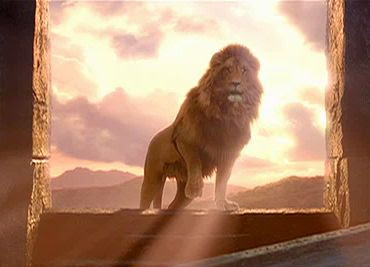One of my favorite books growing up was The Lion, the Witch, and the Wardrobe. (SPOILER ALERT: If you haven't read the book or seen the movie before, you might want to skip to the third paragraph.) I remember how hard I cried when I read it for the first time and realized that Aslan had decided to sacrifice himself on the Stone Table so that Edmund would live. I was inconsolable that night, knowing that the king of Narnia was dying like this. Knowing that, while Edmund would no longer be in the clutches of the White Witch, she had ultimately won. It would only be a matter of time before winter again fell over the whole of Narnia. It got to the point where I tossed the book in the corner of my bedroom, determined not to read the rest of it. But a voice in my head reminded me that the story wasn't finished. Later that night, I grabbed the book and read it till the end. It was well worth it. Within about thirty minutes, I went from feeling miserable and hopeless to feeling the kind of excitement and joy that sticks in your memory twenty years later. Aslan was alive; he was even stronger than before. As in most great stories, good wins over evil. After years of winter, Narnia was at peace, ruled by the just and wise main characters of the book.
How different would my experience with the book have been if I had kept crying and left it in the corner of my bedroom? Perhaps a friend of mine would have told me the true ending a few years later. But the rush of positive feelings I had, and that sense of being inside the story with the characters as they realized that Aslan wasn't dead, would have been gone. I suspect CS Lewis wouldn't have become one of my favorite authors. When I was fourteen and started to read his non-fiction books, I discovered that much of The Lion, the Witch, and the Wardrobe was a Christian allegory, with Aslan representing God/Jesus and the White Witch representing evil/Satan. What would happen if we were to reach Jesus' death on the cross, the sacrifice that he made for our sins, and close our Bibles there? We miss the victory of God. Evil wins, and “Good Friday” is no longer so good, since Jesus dies and stays dead. Although most Christians wouldn't literally close their Bibles at the death of Jesus, I think there's a danger of forgetting about Easter once it passes. The resurrection belongs at the forefront of our Christian beliefs and worldview, not at its periphery.
Jesus' death and resurrection were a bit like a tidal wave, crashing down and having drastic effects throughout creation, to the shock especially of everyone who encountered the risen Jesus. He was not a ghost or a spirit. Nor was his body quite like ours, being now incorruptible. It was something the world had never seen before. Now at this point, “modern” people will object, saying that resurrection is impossible. “We know through our study of science that the world doesn't work this way,” they might argue. “Unlike those naïve, gullible people two thousand years ago, we know that dead people stay dead.” As we can see in the gospel accounts, though, Jesus' resurrection was as much of a surprise to his followers as it would be for us today. The apostles believed in what they saw, and they established the church on the basis of his resurrection. Two thousand years later, we don't have that ability to see the risen Jesus as they did. We can't ask for physical proof of his resurrection like Thomas. But, having not seen him, we nonetheless believe. That faith, I think, is the best Easter present that any of us can be given.
I spent most of the year 2012 in Egypt. Two weeks after Easter, I went with a Christian Egyptian friend to a service at his church. (Christians make up about ten percent of the country's population, most of them being Eastern Orthodox.) It was one of the most festive and exuberant environments I've ever been in. People were celebrating for all they were worth; the liturgy was triumphant and uplifting. And this was an entire two weeks after the holiday itself. In our minds, do we place more importance on Christmas, Advent, and Lent, than Easter?
Easter morning has come and gone. But as Christians we should be celebrating it every day of our lives. Jesus' resurrection is the source of our consolation and our joy, and the basis of our hope for eternal life. It is a hope that was lovingly promised to us on a Sunday morning that changed the course of world history and continues to transform and renew us, day by day.

No comments:
Post a Comment